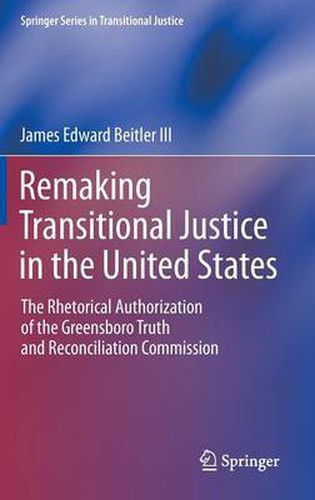Readings Newsletter
Become a Readings Member to make your shopping experience even easier.
Sign in or sign up for free!
You’re not far away from qualifying for FREE standard shipping within Australia
You’ve qualified for FREE standard shipping within Australia
The cart is loading…






This title is printed to order. This book may have been self-published. If so, we cannot guarantee the quality of the content. In the main most books will have gone through the editing process however some may not. We therefore suggest that you be aware of this before ordering this book. If in doubt check either the author or publisher’s details as we are unable to accept any returns unless they are faulty. Please contact us if you have any questions.
Remaking Transitional Justice in the United States: The Rhetoric of the Greensboro Truth and Reconciliation Commission explores rhetorical attempts to authorize the Greensboro Truth and Reconciliation Commission-a grassroots, U.S.-based truth commission created in 2004 toredress past injustices in the city. Through detailed rhetorical analyses, the book demonstratesthat the development of the field of transitional justice has given rise to a transnational rhetorical tradition that provides those working in the field with series of enabling constraints. The book then shows how Greensboro stakeholders attempted to reaccentuate this rhetorical tradition in their rhetorical performances to construct authority and bring about justice, even as the tradition shaped their discourse in ways that limited the scope of their responses. Calling attention to the rhetorical interdependence among practitioners of transitional justice, this study offers insights into the development of transitional justice in the United States and in grassroots contexts in other liberal democracies. The volume is a relevant guide to scholars and practitioners of transitional justice as it brings into relief mechanisms of transitional justice that are frequently overlooked-namely, rhetorical mechanisms. It also speaks to any readers who may be interested in the communicative strategies/tactics that may be employed by grassroots transitional justice initiatives.
$9.00 standard shipping within Australia
FREE standard shipping within Australia for orders over $100.00
Express & International shipping calculated at checkout
This title is printed to order. This book may have been self-published. If so, we cannot guarantee the quality of the content. In the main most books will have gone through the editing process however some may not. We therefore suggest that you be aware of this before ordering this book. If in doubt check either the author or publisher’s details as we are unable to accept any returns unless they are faulty. Please contact us if you have any questions.
Remaking Transitional Justice in the United States: The Rhetoric of the Greensboro Truth and Reconciliation Commission explores rhetorical attempts to authorize the Greensboro Truth and Reconciliation Commission-a grassroots, U.S.-based truth commission created in 2004 toredress past injustices in the city. Through detailed rhetorical analyses, the book demonstratesthat the development of the field of transitional justice has given rise to a transnational rhetorical tradition that provides those working in the field with series of enabling constraints. The book then shows how Greensboro stakeholders attempted to reaccentuate this rhetorical tradition in their rhetorical performances to construct authority and bring about justice, even as the tradition shaped their discourse in ways that limited the scope of their responses. Calling attention to the rhetorical interdependence among practitioners of transitional justice, this study offers insights into the development of transitional justice in the United States and in grassroots contexts in other liberal democracies. The volume is a relevant guide to scholars and practitioners of transitional justice as it brings into relief mechanisms of transitional justice that are frequently overlooked-namely, rhetorical mechanisms. It also speaks to any readers who may be interested in the communicative strategies/tactics that may be employed by grassroots transitional justice initiatives.